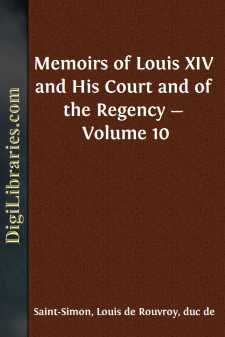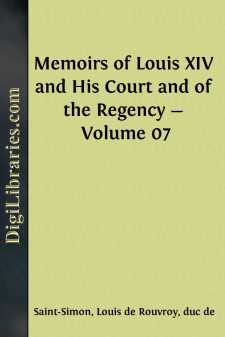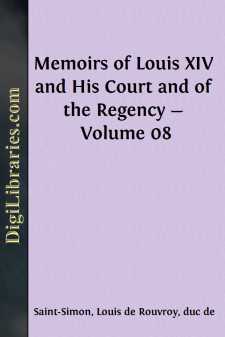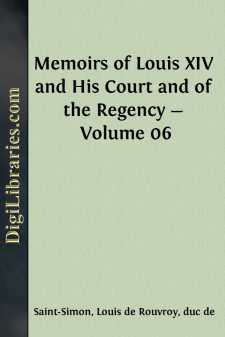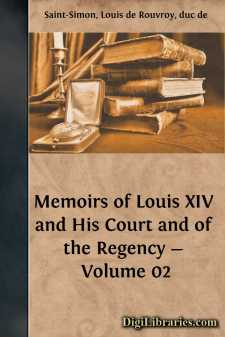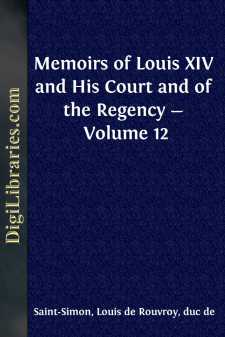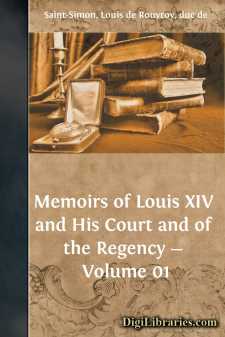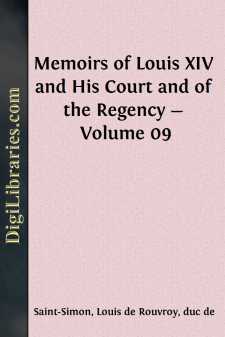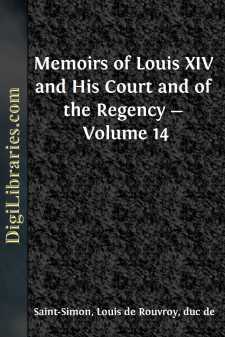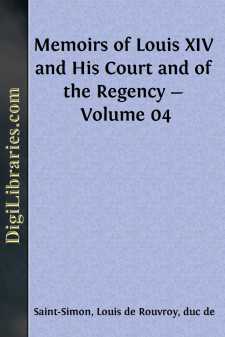Categories
- Antiques & Collectibles 13
- Architecture 36
- Art 48
- Bibles 22
- Biography & Autobiography 813
- Body, Mind & Spirit 142
- Business & Economics 28
- Children's Books 17
- Children's Fiction 14
- Computers 4
- Cooking 94
- Crafts & Hobbies 4
- Drama 346
- Education 46
- Family & Relationships 57
- Fiction 11829
- Games 19
- Gardening 17
- Health & Fitness 34
- History 1377
- House & Home 1
- Humor 147
- Juvenile Fiction 1873
- Juvenile Nonfiction 202
- Language Arts & Disciplines 88
- Law 16
- Literary Collections 686
- Literary Criticism 179
- Mathematics 13
- Medical 41
- Music 40
- Nature 179
- Non-Classifiable 1768
- Performing Arts 7
- Periodicals 1453
- Philosophy 64
- Photography 2
- Poetry 896
- Political Science 203
- Psychology 42
- Reference 154
- Religion 513
- Science 126
- Self-Help 84
- Social Science 81
- Sports & Recreation 34
- Study Aids 3
- Technology & Engineering 59
- Transportation 23
- Travel 463
- True Crime 29
Memoirs of Louis XIV and His Court and of the Regency - Volume 10
Description:
Excerpt
The reign of Louis XIV. was approaching its conclusion, so that there is now nothing more to relate but what passed during the last month of his life, and scarcely so much. These events, indeed, so curious and so important, are so mixed up with those that immediately followed the King's death, that they cannot be separated from them. It will be interesting and is necessary to describe the projects, the thoughts, the difficulties, the different resolutions, which occupied the brain of the Prince, who, despite the efforts of Madame de Maintenon and M. du Maine, was of necessity about to be called to the head of affairs during the minority of the young King. This is the place, therefore, to explain all these things, after which we will resume the narrative of the last month of the King's life, and go on to the events which followed his death.
But, as I have said, before entering upon this thorny path, it will be as well to make known, if possible, the chief personage of the story, the impediments interior and exterior in his path, and all that personally belonged to him.
M. le Duc d'Orleans was, at the most, of mediocre stature, full-bodied without being fat; his manner and his deportment were easy and very noble; his face was broad and very agreeable, high in colour; his hair black, and wig the same. Although he danced very badly, and had but ill succeeded at the riding-school, he had in his face, in his gestures, in all his movements, infinite grace, and so natural that it adorned even his most ordinary commonplace actions. With much ease when nothing constrained him, he was gentle, affable, open, of facile and charming access; the tone of his voice was agreeable, and he had a surprisingly easy flow of words upon all subjects which nothing ever disturbed, and which never failed to surprise; his eloquence was natural and extended even to his most familiar discourse, while it equally entered into his observations upon the most abstract sciences, on which he talked most perspicuously; the affairs of government, politics, finance, justice, war, the court, ordinary conversation, the arts, and mechanics. He could speak as well too upon history and memoirs, and was well acquainted with pedigrees. The personages of former days were familiar to him; and the intrigues of the ancient courts were to him as those of his own time. To hear him, you would have thought him a great reader. Not so. He skimmed; but his memory was so singular that he never forgot things, names, or dates, cherishing remembrance of things with precision; and his apprehension was so good, that in skimming thus it was, with him, precisely as though he had read very laboriously. He excelled in unpremeditated discourse, which, whether in the shape of repartee or jest, was always appropriate and vivacious. He often reproached me, and others more than he, with "not spoiling him;" but I often gave him praise merited by few, and which belonged to nobody so justly as to him; it was, that besides having infinite ability and of various kinds, the singular perspicuity of his mind was joined to so much exactness, that he would never have made a mistake in anything if he had allowed the first suggestions of his judgment. He oftentimes took this my eulogy as a reproach, and he was not always wrong, but it was not the less true. With all this he had no presumption, no trace of superiority natural or acquired; he reasoned with you as with his equal, and struck the most able with surprise. Although he never forgot his own position, nor allowed others to forget it, he carried no constraint with him, but put everybody at his ease, and placed himself upon the level of all others.
He had the weakness to believe that he resembled Henry IV. in everything, and strove to affect the manners, the gestures, the bearing, of that monarch. Like Henry IV....


